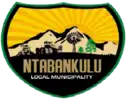Ntabankulu | |
|---|---|
 Seal | |
.svg.png.webp) Location in the Eastern Cape | |
| Coordinates: 32°10′S 28°35′E / 32.167°S 28.583°E | |
| Country | South Africa |
| Province | Eastern Cape |
| District | Alfred Nzo |
| Seat | Tabankulu |
| Wards | 18 |
| Government | |
| • Type | Municipal council |
| • Mayor | Priscilla Tsileng Sobuthongo (ANC) |
| • Speaker | Vuyokazi Matwasa (ANC) |
| • Chief Whip | Sesulo Sophaqa (ANC) |
| Area | |
| • Total | 1,385 km2 (535 sq mi) |
| Population (2011)[2] | |
| • Total | 123,976 |
| • Density | 90/km2 (230/sq mi) |
| Racial makeup (2011) | |
| • Black African | 99.4% |
| • Coloured | 0.4% |
| • Indian/Asian | 0.1% |
| • White | 0.1% |
| First languages (2011) | |
| • Xhosa | 95.2% |
| • English | 1.4% |
| • Other | 3.4% |
| Time zone | UTC+2 (SAST) |
| Municipal code | EC444 |
Ntabankulu Municipality (Xhosa: uMasipala wase Ntabankulu) is a local municipality within the Alfred Nzo District Municipality, in the Wild Coast Region of the Eastern Cape province of South Africa. Ntabankulu is an isiXhosa word meaning "great or big mountain", since the municipal area is mountainous in character.[4]
It was formerly part of the OR Tambo District Municipality, but was transferred to the Alfred Nzo District Municipality after the 2011 municipal election.[5]
Main places
The 2011 census for the Ntabankulu Municipality states a population of 123,976 with these most populated main places[6]
| Place | Code | Area (km2) | Population | Most spoken language |
|---|---|---|---|---|
| Bhakubha | 298039 | 3.84 | 2,431 | Xhosa |
| Bhonxa | 298061 | 8.43 | 3,969 | Xhosa |
| Dambeni | 298062 | 11.52 | 3,983 | Xhosa |
| Dedelo | 298015 | 12.48 | 2,957 | Xhosa |
| Matshona | 298096 | 7.41 | 4,427 | Xhosa |
| Mbongweni | 298013 | 8.86 | 3,104 | Xhosa |
| Mfundisweni | 298037 | 4.50 | 2,793 | Xhosa |
| Tabankulu | 298077 | 19.51 | 3,266 | Xhosa |
| Full Ntabanku 2011 census data | 298 | 1,384.96 | 123,976 | Xhosa |
Politics
The municipal council consists of thirty-eight members elected by mixed-member proportional representation. Nineteen councillors are elected by first-past-the-post voting in nineteen wards, while the remaining nineteen are chosen from party lists so that the total number of party representatives is proportional to the number of votes received. In the election of 1 November 2021 the African National Congress (ANC) won a majority of thirty-one seats on the council. The following table shows the results of the election.[7]
| Party | Ward | List | Total seats | |||||
|---|---|---|---|---|---|---|---|---|
| Votes | % | Seats | Votes | % | Seats | |||
| African National Congress | 25,752 | 81.48 | 19 | 25,540 | 80.93 | 12 | 31 | |
| Economic Freedom Fighters | 3,483 | 11.02 | 0 | 3,710 | 11.76 | 4 | 4 | |
| African Transformation Movement | 498 | 1.58 | 0 | 512 | 1.62 | 1 | 1 | |
| Democratic Alliance | 439 | 1.39 | 0 | 440 | 1.39 | 1 | 1 | |
| African Independent Congress | 251 | 0.79 | 0 | 499 | 1.58 | 1 | 1 | |
| Independent candidates | 674 | 2.13 | 0 | 0 | ||||
| United Democratic Movement | 271 | 0.86 | 0 | 326 | 1.03 | 0 | 0 | |
| God Save Africa | 126 | 0.40 | 0 | 194 | 0.61 | 0 | 0 | |
| Socialist Party of South Africa | 84 | 0.27 | 0 | 143 | 0.45 | 0 | 0 | |
| Patriotic Alliance | 22 | 0.07 | 0 | 122 | 0.39 | 0 | 0 | |
| Independent South African National Civic Organisation | 5 | 0.02 | 0 | 71 | 0.22 | 0 | 0 | |
| Total | 31,605 | 100.00 | 19 | 31,557 | 100.00 | 19 | 38 | |
| Valid votes | 31,605 | 97.77 | 31,557 | 97.28 | ||||
| Invalid/blank votes | 721 | 2.23 | 881 | 2.72 | ||||
| Total votes | 32,326 | 100.00 | 32,438 | 100.00 | ||||
| Registered voters/turnout | 67,099 | 48.18 | 67,099 | 48.34 | ||||
References
- ↑ "Contact list: Executive Mayors". Government Communication & Information System. Archived from the original on 14 July 2010. Retrieved 22 February 2012.
- 1 2 "Statistics by place". Statistics South Africa. Retrieved 27 September 2015.
- ↑ "Statistics by place". Statistics South Africa. Retrieved 27 September 2015.
- ↑ South African Languages - Place names
- ↑ "MFMA Circular No. 54: Municipal Budget Circular for the 2011/12 MTREF" (PDF). National Treasury. 10 December 2010. p. 5. Retrieved 23 March 2011.
- ↑ "Census 2011: Local Municipality: Ntabankulu". census2011.adrianfrith.com. Retrieved 14 August 2020.
- ↑ "Election Result Table for LGE2021 — Ntabankulu". wikitable.frith.dev. Retrieved 30 December 2021.
.svg.png.webp)